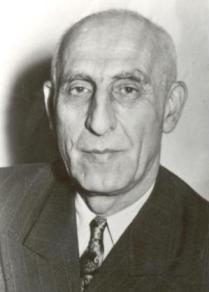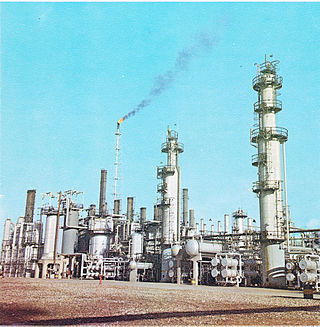Related Research Articles

Mohammad Mosaddegh was an Iranian politician, author, and lawyer who served as the 35th Prime Minister of Iran from 1951 to 1953, after appointment by the 16th Majlis. He was a member of the Iranian parliament from 1923, and served through a contentious 1952 election into the 17th Iranian Majlis, until his government was overthrown in the 1953 Iranian coup d'état aided by the intelligence agencies of the United Kingdom (MI6) and the United States (CIA), led by Kermit Roosevelt Jr. His National Front was suppressed from the 1954 election.

TotalEnergies SE is a French multinational integrated energy and petroleum company founded in 1924 and is one of the seven supermajor oil companies. Its businesses cover the entire oil and gas chain, from crude oil and natural gas exploration and production to power generation, transportation, refining, petroleum product marketing, and international crude oil and product trading. TotalEnergies is also a large-scale chemicals manufacturer.

The Anglo-Persian Oil Company (APOC) was a British company founded in 1909 following the discovery of a large oil field in Masjed Soleiman, Persia (Iran). The British government purchased 51% of the company in 1914, gaining a controlling number of shares, effectively nationalizing the company. It was the first company to extract petroleum from Iran. In 1935 APOC was renamed the "Anglo-Iranian Oil Company" (AIOC) when Reza Shah formally asked foreign countries to refer to Persia by its endonym Iran.

The Abadan Crisis occurred from 1951 to 1954, after Iran nationalised the Iranian assets of the BP controlled Anglo-Iranian Oil Company (AIOC) and expelled Western companies from oil refineries in the city of Abadan.

BP Canada was a Canadian petroleum company and subsidiary of British Petroleum that existed between 1955 and 1992. The name refers to a group of companies that engaged in various segments of the petroleum industry lifecycle. BP entered the Canadian market in October 1953, when it purchased a 23 percent stake in the Triad Oil Company. In 1955, BP formed a Canadian subsidiary, based in Montreal, called BP Canada Limited. The company began acquiring retail stations in Ontario and Quebec and in 1957 started construction on a refinery in Montreal. By the end of the 1950s BP Canada was a fully-integrated operation. In 1964, it acquired from Cities Service the Oakville Refinery, and then expanded its operations significantly in 1971 when it acquired Supertest Petroleum.

The Iraq Petroleum Company (IPC), formerly known as the Turkish Petroleum Company (TPC), is an oil company that had a virtual monopoly on all oil exploration and production in Iraq between 1925 and 1961. It is jointly owned by some of the world's largest oil companies and headquartered in London, England. However, today it is only a paper entity with historical rights and plays no part in the modern development of Middle Eastern oil.

The National Front of Iran is an opposition political organization in Iran, founded by Mohammad Mosaddegh in 1949. It is the oldest and arguably the largest pro-democracy group operating inside Iran despite having never been able to recover the prominence it had in the early 1950s.

The National Iranian Oil Company is a government-owned national oil and natural gas producer and distributor under the direction of the Ministry of Petroleum of Iran. NIOC was established in 1948 and restructured under The Consortium Agreement of 1954. NIOC ranks as the world's second largest oil company, after Saudi Arabia's state-owned Aramco.

All the Shah's Men: An American Coup and the Roots of Middle East Terror is a book written by American journalist Stephen Kinzer. The book discusses the 1953 Iranian coup d'état backed by the U.S. Central Intelligence Agency (CIA) in which Mohammed Mossadegh, Iran's democratically elected prime minister, was overthrown by Islamists supported by American and British agents and royalists loyal to Shah Mohammad Reza Pahlavi.

Ali Razmara, also known as Haj Ali Razmara, was a military leader and prime minister of Iran.
For further details see the "Energy crisis" series by Facts on File.
The National Oil Corporation is the national oil company of Libya. It dominates Libya's oil industry, along with a number of smaller subsidiaries, which combined account for around 70% the country's oil output. Of NOC's subsidiaries, the largest oil producer is the Waha Oil Company (WOC), followed by the Arabian Gulf Oil Company (Agoco), Zueitina Oil Company (ZOC), and Sirte Oil Company (SOC).

The Abadan refinery is an oil refinery in Abadan, Iran near the coast of the Persian Gulf.
The Iranian Revolution of 1979, in which Shah Mohammed Reza Pahlavi was overthrown and replaced by an Islamist government led by Ruhollah Khomeini, has been the subject of conspiracy theories alleging Western involvement, in particular, that the United States and the United Kingdom secretly opposed the Shah because his White Revolution and Iran's growing independence was unfavorable to their interests in Iranian petroleum. In his own memoirs, Answer to History, the Shah alleges that Western forces most prominently the United Kingdom, the United States, and Big Oil conspired against him all for their own reasons while most notably, he claims due to his manipulation of oil prices.
As of 2017, Azerbaijan produced a range of metals and industrial minerals, including aluminum, bentonite, copper, gold, iodine, limestone, silver and steel.

BP p.l.c. is a British multinational oil and gas company headquartered in London, England. It is one of the oil and gas "supermajors" and one of the world's largest companies measured by revenues and profits. It is a vertically integrated company operating in all areas of the oil and gas industry, including exploration and extraction, refining, distribution and marketing, power generation, and trading.

British Tanker Company Limited was the maritime transport arm of the Anglo-Persian Oil Company, the forerunner of BP. Formed in 1915 with an initial fleet of seven oil tankers, the British Tanker Company became the BP Tanker Company in 1955.

Iran is an energy superpower and the petroleum industry in Iran plays an important part in it. In 2004, Iran produced 5.1 percent of the world's total crude oil, which generated revenues of US$25 billion to US$30 billion and was the country's primary source of foreign currency. At 2006 levels of production, oil proceeds represented about 18.7% of gross domestic product (GDP). However, the importance of the hydrocarbon sector to Iran's economy has been far greater. The oil and gas industry has been the engine of economic growth, directly affecting public development projects, the government's annual budget, and most foreign exchange sources.

The nationalization of the Iranian oil industry resulted from a movement in the Iranian parliament (Majlis) to seize control of Iran's oil industry, which had been run by private companies, largely controlled by foreign interests. The legislation was passed on March 15, 1951, and was verified by the Majlis on March 17, 1951. The legislation led to the nationalization of the Anglo-Iranian Oil Company (AIOC). The movement was led by Mohammad Mosaddegh, a member of the Majlis for the National Front and future prime minister of Iran. The movement to nationalize the oil industry was the reaction to the following concessions made by Iran to foreign powers: the Reuter concession of 1872, proceeding letter,D'Arcy Concession?] the 1933 agreement between the Iranian government and AIOC, and the Gas-golshaian[?] contract. According to the political scientist Mark J. Gasiorowski, the oil nationalization movement had two major results: the establishment of a democratic government and the pursuit of Iranian national sovereignty.
The 1973 Sale and Purchase Agreement was a 20-year agreement pressured by the Shah of Iran on the oil consortium that nullified The Consortium Agreement of 1954 and provided the National Iranian Oil Company with complete control of Iranian petroleum nationalizing the nation's oil reserves. By 1975, western oil companies complained of the agreement and demanded renegotiation marking the first time in history that oil companies rather than the oil producing nations sought to negotiate an oil contract.
References
- ↑ "The Consortium Agreement of 1954".
- ↑ Kinzer, All the Shah's Men (2003), p. 110,
- ↑ Kinzer, All the Shah's Men (2003), p. 135-136.
- 1 2 "Iran Tells Oil Consortium Pact Will Not Be Renewed – Companies Dispute Legal Right of Shah to End Contract in 1979 Nationalized in 1951". New York Times. January 24, 1973. p. 51. Retrieved September 8, 2019.
- ↑ Cooper, Andrew. The Fall of Heaven . p. 79.
- ↑ Goodgame, Peter (11 August 2002). "The Globalists and the Islamists". Redmoonrising.
- ↑ "Iran Tells Oil Consortium Pact Will Not Be Renewed". The New York Times .
- 1 2 "The Day Iranian Oil Really Became National". petromuseum.ir. Retrieved 2023-03-06.
- 1 2 پرويز, مينا،; Mīnā, Parvīz (1998). تحول صنعت نفت ايران: نگاهى از درون : مصاحبه با پرويز مينا (in Persian). بنياد مطالعات ايران،. ISBN 978-0-936347-89-9.